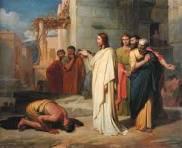
It is interesting that the two lepers who expressed gratitude to God were foreigners. Naaman was a Syrian, whose cure in the river Jordan was brought about through a young slave girl from Israel. Naaman was transformed by what had happened to him and recognised the God of Israel as the only God. Likewise, the Samaritan leper stopped to take stock of what Jesus had done for him.
The Samaritans were despised by the Jews, and therefore the Samaritan leper was doubly an outcast. Jesus seems to have had a different attitude toward them, since in the parable of the Good Samaritan it is that outsider who is the hero (Luke 10:25-37). In chapter 4 of John, Jesus conversed at a deep level with a Samaritan woman and sent her to be an apostle to her people.
St Ignatius of Loyola saw gratitude as the basis of all other virtues. When we look at what God has done for us and the love he has for us, our thankfulness brings us into a deeper relationship with him. Jesus must have been hurt by the reaction of the nine lepers. Perhaps they were so excited by their freedom from disease, which made them pariahs, that they rushed off to show themselves to the priests. In doing so, however, they deprived themselves of the more intimate spiritual cure which Naaman and the Samaritan leper received. It was a neglected opportunity.